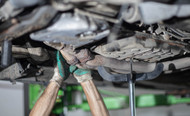Troubleshooting Common Catalytic Converter Issues in California
18th Sep 2025
Your vehicle’s catalytic converter is a critical component in keeping emissions low and maintaining compliance with California’s strict environmental standards. When this part begins to fail, it not only impacts your car’s performance but can also prevent it from passing smog checks. Understanding how to spot issues, when to consider a catalytic converter replacement, and what steps to take next is key for any California driver.
When to Replace a Catalytic Converter
Drivers often wonder how to tell when it’s time to replace catalytic converter components in their vehicles. The most common signs include a noticeable drop in engine performance, poor fuel efficiency, and sulfur-like odors coming from the exhaust. In some cases, you may even hear rattling sounds if the internal ceramic honeycomb has broken apart. Since these symptoms can overlap with other mechanical problems, learning how to troubleshoot more specifically can help narrow down the issue.
Common Diagnostic Trouble Codes (DTCs)
Modern vehicles rely on onboard diagnostics (OBD-II systems) that monitor emissions performance. If your “check engine” light comes on, scanning the car with an OBD-II reader can reveal helpful codes. The most frequent ones associated with catalytic converter issues include:
- P0420 – Catalyst system efficiency below threshold (Bank 1)
- P0430 – Catalyst system efficiency below threshold (Bank 2)
- P0421 – Warm-up catalyst efficiency below threshold
- P0431 – Warm-up catalyst efficiency below threshold
If you see any of these codes, it’s often an indicator that the converter is not processing exhaust gases effectively. While oxygen sensors or exhaust leaks can trigger similar codes, recurring errors typically point toward the need for a catalytic converter replacement.
DIY Checks You Can Perform Safely
While some diagnostic work should be left to professionals, there are a few basic checks car owners can attempt. Always use protective gloves, eyewear, and ensure your vehicle is cooled down before starting.
- Visual Inspection: Look for dents, cracks, or discoloration on the converter housing. Severe heat damage may suggest internal failure.
- Exhaust Flow Test: If you notice poor acceleration, a clogged converter may be restricting exhaust flow. You can carefully hold your hand near (but not directly on) the tailpipe to sense weaker airflow.
- Listening for Rattles: A metallic rattling sound under the car, especially when starting or idling, often indicates a damaged honeycomb inside the converter.
Remember, if you are not confident in performing these checks, it’s best to leave the work to a certified mechanic.
When to Seek Professional Help
While troubleshooting can reveal potential problems, only a professional mechanic can confirm whether you need to replace catalytic converter parts or if another issue is at play. Specialists have the tools to measure back pressure, check oxygen sensor performance, and verify emissions efficiency. In California, where emissions compliance is mandatory, attempting a temporary fix or ignoring the warning signs could lead to costly fines or failed smog inspections.
Professional service ensures that the right part is installed, calibrated correctly, and compliant with California Air Resources Board (CARB) standards. Choosing trusted suppliers like HottExhaust gives you access to CARB-approved converters that keep your vehicle running efficiently and legally on the road.
Final Thoughts
Your catalytic converter is more than just a part—it’s your ticket to staying compliant in California’s rigorous emissions environment. By learning how to troubleshoot common issues, keeping an eye out for warning codes, and knowing when to call in expert help, you can extend the life of your vehicle while protecting the environment.
Looking for a reliable solution? Browse HottExhaust today to find high-quality, CARB-compliant catalytic converters for your vehicle.

